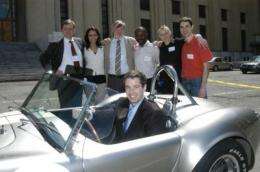New LifePO4 battery made from non-toxic materials

Thousands of small electric scooters, bicycles and wheelchairs throughout Europe and Asia are powered by LifePO4 -- a material used in advanced lithium-ion batteries developed by Université de Montréal researchers.
"It's a revolutionary battery because it is made from non-toxic materials abundant in the Earth's crust. Plus, it's not expensive,'" says Michel Gauthier, an invited professor at the Université de Montréal Department of Chemistry and co-founder of Phostech Lithium, the company that makes the battery material. "This battery could eventually make the electric car very profitable."
The theory will soon be tested, since the 100 percent electric Microcar that's set to debut in Europe this year will be and powered by the LifePO4 battery.
Phostech Lithium's production plant in St. Bruno, Quebec, produces the black LifePO4 powder, which is shipped across the world in tightly sealed barrels.
"The theoretical principle behind the battery was patented by a University of Texas professor in 1995. However, without the work of local chemists such as Nathalie Ravet, we couldn't have developed it," says Phostech Lithium engineer Denis Geoffroy.
Süd-Chemie, a leading specialty chemistry company based in Germany, first invested in Phostech Lithium in 2005. Now, just four years later, Süd-Chemie's total Canadian investments have reached $13 million and it stands as the 100% owner of Phostech Lithium. Phostech's St. Bruno plant began to produce LiFePO4 in 2006 with 20 employees and a 400 metric-ton capacity. Since then, Phostech has nearly doubled its staff.
"It is a battery that is much more stable and much safer," says Dean MacNeil, a professor at the Université de Montréal's Department of Chemistry and new NSERC-Phostech Lithium Industrial Research Chair in Energy Storage and Conversion. "In addition, it recharges much faster than previous batteries."
The NSERC Research Chair, funded in part by Phostech Lithium, will help investigate ways to improve the LifePO4 battery.
For Gauthier, Phostech Lithium is the product of academia and the business world coming together. "Even if we knew that lithium, iron and phosphate were theoretically promising materials, we had to make them efficient. We had to find the right voltage and maintain the right charging and discharging properties. This is where the university played a major role."
Source: University of Montreal (news : web)
















